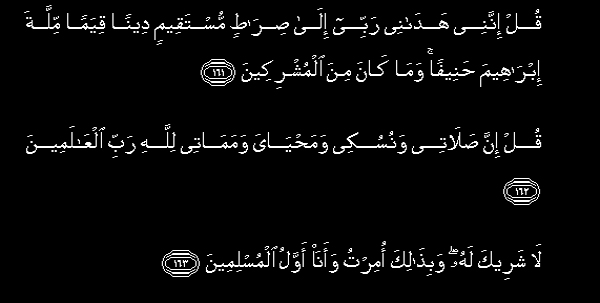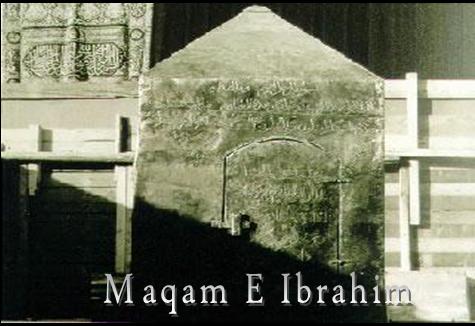|
||||||||||||||||||||||

|
||||||||||||||||||||||
 |
||||||||||||||||||||||
|
|
||||||||||||||||||||||
|
|
Loyalty, Love & Devotion...
|
|||||||||||||||||||||
|
|
Muslims celebrate the life of Ibrahim (AS) every year during Hajj. He was one of the mightiest Messengers of Allah known for his special status with Allah SWT as Khaleel-ullah (intimate friend of Allah). He is the forefather of our beloved Prophet SAW and we send blessings and prayers on him (AS) during every salah. What did Ibrahim (AS) do to receive such high status from Allah SWT? We will briefly go over the story of Ibrahim (AS) and try to extract messages from it that earned him this high status with Allah SWT. |
Before we reiterate the story of Ibrahim (AS), we will mention two brief points, which will InshaAllah help us understand the messages further.
When Allah SWT created Adam (AS) and Hawwa (AS), he said to them, "Do not eat from this tree.."
|
This was the first divine command to mankind. The purpose was to check their obedience. A point worthy of our notice is that Allah SWT does not give details about the tree, rather just mentions the command; why? - It is from the wisdom of Allah SWT which we may never comprehend. But when we try to seek guidance from the story, the message is fairly simple: Allah SWT wants loyalty only to Him. He SWT wanted that from Adam (AS), from Ibrahim (AS) and by extension from all believers. From His very first message, Allah SWT lays the foundation of happiness and success for humanity to be in the obedience and loyalty to Him SWT. He SWT lets us know that He is the Provider, Sustainer, the only One who is able to grant prayers and wishes. We, however, instead of asking Allah SWT start acting up and go crazy if we don't get what we want. We forget that He is |

|
Regardless of our situation in life, we are all drowning in the bounties of Allah SWT. If you have food to eat and a place to sleep you are among the richest of humanity. If you are healthy, you only have to look to the hospitals where the wealthiest would give all they own to have what you have. If you have been inflicted with a calamity, think of the power of patience and its reward - and you will know that you will be a winner at the end. If you are a sinner, know the limitless mercy of Allah who provides us many chances to seek forgiveness.
How can we not realize the mercy of Allah SWT when He provides us with so much wealth and forgiveness during Ramadan, by giving us nights like Laylatul Qadr. By granting us the ability and chance to perform Hajj by which He promises complete forgiveness from all sins. What about when Allah SWT promises to forgive the sins of last year and the coming year for people who fast on the day of Arafah (9th of Dhul Hijjah)?
Keeping these bounties in mind, we need to analyze ourselves:
Where are we?
Where does our obedience lie?
How many other people are we obedient to?
And how much of our obedience is to Allah SWT, the only One who deserves it?

Allah SWT says in Surah Al-An'am:

Say, "Indeed, my Lord has guided me to a straight path - a correct religion - the way of Abraham, inclining toward truth. And he was not among those who associated others with Allah ." Say, "Indeed, my prayer, my rites of sacrifice, my living and my dying are for Allah , Lord of the worlds. No partner has He. And this I have been commanded, and I am the first [among you] of the Muslims." (6:161-163)
Ibrahim (AS) is referred to as Haneef or one whose life was an embodiment of the "oneness of Allah". And since we-Muslims, claim to follow the deen of Ibrahim, "oneness of Allah" should be the central focus of our lives as well from which stems everything else.
Ibrahim (AS)'s story can be termed as the mother of all stories based on the amount and magnitude of messages we get from it. Allah SWT called Ibrahim (AS) "Khaleel-ullah." The common translation of Khaleel-ullah as the 'Friend of Allah SWT' is far from doing justice to this illustrious title.
According to scholars of Arabic language, the word khalla, from which the word khaleel is derived, indicates a greater degree of love than is conveyed by the word friend. "Khaleel" means the close companion/ loving and beloved friend. Looking at our own lives, we may have many friends, but how many khaleels can we have? We cannot claim to have many khaleels or multiple close confidants. A khaleel is closest to the heart - it can belong to only one. This is why Allah SWT gave this title to no one else except Ibrahim (AS).
We will provide a short synopsis of the life of Ibrahim (AS) below:
Even when he was a boy (between 7-10 years of age) he disbelieved in the customs of his people and disagreed with assigning partners to Allah SWT. We see that from his questioning of his father about idol worshipping:

[Mention] when he said to his father, "O my father, why do you worship that which does not hear and does not see and will not benefit you at all? (19:42)
His father was an artisan who used to make idols and then sell them. When he ordered Ibrahim (AS) to sell those in the market, he had the courage to refuse his father's command even at such a tender age. Since his early youth, he refused to compromise the loyalty to the oneness of Allah whose resonance he felt in his heart and soul.
During his young adulthood, (according to most reports, he was between the ages of 10 - 14) he stood alone against his people. He challenged their paganism by destroying the idols in the temple. People who knew of his disdain of idolatry cornered him, but he wisely made them doubt their beliefs by asking them to question the largest idol that he had left untouched. Since he knew and they knew the idol won't be able to provide answers, his point was to make them stop and question their actions.
The main point here is that Ibrahim (AS) was the only Muslim during that time to walk on the face of the earth. He was Haneef and against all odds his loyalty was towards Allah!
Ibrahim (AS) after challenging his community, challenged the king who proclaimed he was the godhead. The king's arrogance and insolence could not stand against the pure faith of Khaleel-ullah. All of his claims were met with wise answers by Ibrahim (AS) who never for a moment swayed from his message of proclaiming the grandeur of Allah SWT. Ibrahim (AS) sketched an unparalleled history of loyalty and devotion when he was thrown in fire by the king; and in the middle of the predicament he refused even the help of the angels and relied only on Allah SWT.
Allah adorned Ibrahim (AS) with four qualities beloved to Him SWT:
One man = A nation (or Ummah)
Yes! He stood against a nation, as an entire nation himself, only for the sake of Allah SWT.
Let's reflect over this for a moment, can we have any excuses? Alhamdulillah, we are not facing a whole nation alone, yet where are our loyalties? Can we fear anything or anybody if we trust Allah SWT as our sole protector? We may talk about this but do we do it? Ibrahim (AS) did it! Why can't we? What does it say about our faith? What does it say about our love for Allah SWT?He delivered and kept his covenant and commitment.
The Arabic word used here is derived from the word waffa', meaning "to complete, to fulfill." Early Muslim scholars describe this word to include the following:
He kept his promise and covenant about everything; he offered everything he had to Allah SWT:
- his body - to the fire;
- his heart - by obeying Allah and leaving Hajar and Ismail in the desert and later by agreeing to sacrifice Ismail;
- his money
he used to cry a lot (kaana awwaban muniba)
The question is: what did he cry for?
To pass his exams? For the love of another person? Asking Allah for this or that? No, Ibrahim (AS) cried to Allah for the sake of Allah, he wanted the closeness of Allah and was always in a state of du'a to Him.Ibrahim (AS) had complete trust and reliance in Allah SWT (Tawakkul)
Allah SWT says in Surah Ankabut:

Do the people think that they will be left to say, "We believe" and they will not be tried? But We have certainly tried those before them, and Allah will surely make evident those who are truthful, and He will surely make evident the liars. (29:2-3)
Ibrahim's (AS) entire life is an open display of his unwavering reliance on Allah SWT:
- When People around him decided to kill him and they threw him in the burning fire, Ibrahim (AS) had complete trust in Allah SWT and all he said was "Sufficient is my Lord for me".
- When he was asked to leave his wife and son in the desert with no signs of life in that place, he did so without questioning.
- When he was asked to sacrifice his only son, he complied.
All these incidents show Ibrahim (AS)'s complete trust in Allah and his faith that his Khaleel was sufficient for him.
If we love someone, we obey him. Ibrahim (AS) obeyed Allah SWT in all situations because of his pure love for Him SWT. His life and his sacrifices clearly show where his love lied. His love for Allah SWT was above the love of his family, wealth and even his own life.
We claim to love Allah but our hearts are full of duniya (this world), our priority is duniya, our loyalty and dedication is for duniya. Neither our spouses nor our children will help us on the Day of Judgment, but we dedicate our entire lives for them and think we are very intelligent. In reality we are fooling ourselves and masking our eyes from the truth.
Imagine if you die and Allah finds in your heart that you love this duniya above Allah? How disgraceful is that? Allah SWT will say to those unfortunate ones on the Day of Judgment to go to those they dedicated their lives to and get their support.
The companions migrated leaving their families and properties for Allah because they loved Allah more and wanted Him SWT above their worldly possessions. The early Muslims used to dedicate all their actions to Allah SWT to the point they used to marry a person to please Allah and to get closer to Him. All their decisions were guided by their loyalty, love, and devotion to Allah SWT!
 |
Ultimate disgrace is that Allah fills the heart of a person with love for duniya and its pleasures; which can lead to the highest calamity and that is to die without the love of Allah in your heart. Ultimate elevation is when Allah allows a person to perform deeds that are pleasing to Him SWT and the person starts to use all his bounties for Allah's sake. This leads to the ultimate pleasure a person can enjoy in this world which is to work and sacrifice for the sake of Allah. |
Muslims worldwide every year commemorate the ultimate sacrifice Ibrahim offered to Allah in the form of his son. Scholars say that if Allah SWT had not replaced Ismail (AS) with the sheep, we would have to slaughter our own children in order to follow Ibrahim's sunnah! Would we be able to do that, really? Would we still have been considered Muslims if ordered to but refuse to perform the sacrifice? Allah SWT is merciful and it is another one of His divine bounties that He asks us to do what is not hard on our souls.
The purpose of sacrifice is to bring the slave closer to his Lord SWT. It is a metaphor of the willingness of the slave to sacrifice all he has for the pleasure of Allah. It is the best of what we own that is worthy to be offered as a sacrifice to the Lord of the heavens and the earth, not what we don't need. The least we can do is to slaughter the love of everything and everyone else from our hearts and devote our lives for the mission Allah SWT has chosen for us propagation of His deen. This is how we can follow the footsteps of Ibrahim (AS) who was sent as a role model for us.
Allah SWT called Ibrahim (AS) Khaleel-ullah because he gave to Allah. He (AS) gave his love, devotion, trust, reliance, thoughts, tears, sacrifices, obedience- all to Allah SWT who is the only one deserving of them. This in turn earned him what it will earn any other person who does the same: Dignity in this life and the hereafter, true joy and happiness of the soul, tranquility, peace, and contentment.
Early scholars say that Ibrahim (AS) gave to Allah SWT the three things we humans love most:
- his body;
- his heart (his love, feelings and desires);
- his money.
He sacrificed his body when he was thrown into fire.
When Jibreel (AS) offered to rescue him from the fire of the king, Ibrahim (AS) asked if Allah had sent him. When Jibreel (AS) said no, Ibrahim (AS) declined his help. The same scenario was repeated with the angels of wind and rain. His only response to this overwhelming situation was:
Hasbiallahu wa ni'mal wakeel Allah is sufficient for me and He is my Guardian Just think about how many people we rely on when a calamity strikes us? How many phone calls do we make and what is our state of heart and mind? Do we even wait to make du'a and ask Allah first?
Allah teaches us a lesson here:
When we turn to Allah only and rely on Him SWT 100%, He helps 100%!
Even the fire cannot burn without the will of Allah SWT. Ibrahim (AS) sat amidst the fire like one would in a garden of flowers. For a believer any calamity can become a garden of flowers if he relies on Allah SWT. Can we doubt the power of Allah? If we do so what does it say about our iman? Why do we doubt ourselves? More importantly why do we doubt Allah SWT? Can we have a better protector than Him?
Ibrahim (AS) sacrificed his heart (his feelings, love and desires) to Allah SWT by first leaving his wife and only child in a barren valley with no provisions, and then offering his son as a sacrifice.
Ibrahim (AS) first married Sarah who was unable to bear any children. Sarah knew of her husband's desire to leave the seed of prophecy in earth so she offered her slave Hajar to him as a wife. Allah blessed them with Ismail (AS) when Ibrahim (AS) was an aged man.
Having a child at such an old age after giving up all hopes must have been an ecstatic feeling. At this point, Allah SWT ordered Ibrahim (AS) to leave his beloved wife Hajar and their young toddler Ismail (AS) at a deserted place. Ibrahim (AS) devotedly did so and when he started walking away from them, Hajar asked him: "Why are you leaving us here?" He remained quiet until Hajar asked: "Has Allah SWT commanded you to do so?" Ibrahim (AS) replied in affirmative at which she simply responded: "then He will take care of us and protect us."
Try to imagine the faith of a mother who has a nursing baby in her arms and she is not worried about her husband leaving them in the middle of a barren desert! And look at the loyalty of Ibrahim (AS) who is ready to carry out any command of Allah SWT, no matter how hard it is on his soul.
Where are we compared to them? We love our husbands, our wives, our children, our parents, houses, jobs, money; we love everything else in the world except Allah SWT. Our loyalty is towards everybody else except Allah SWT. Our love has become so cheap that we would rather spend our time, money, and efforts over a pair of shoes or meals.
We are ready to do anything for our own satisfaction and benefit but we back out if it is for the sake of Allah SWT, even though we know it is more beneficial for us. Everything in life from spouses to children should be seen as a trial or a blessing. We should continuously be moving ahead in our journey of Iman and if someone is holding us back from it, than it calls for a sacrifice.

As Ismail grew into a young boy, Ibrahim (AS) got a vision from Allah to sacrifice him. The devoted father went to the son and relayed his dream to him, who was bent on immortalizing his own name as the most obedient of Allah's slaves and was ready to surrender to the will of Allah. We all know the story when Allah SWT replaced Ismail (AS) with a ram from the heaven and it is in commemoration of this incident that Muslims perform animal slaughter every year.
This is real loyalty and sincere dedication!
The disease of the Muslim ummah now is that love of everything else is above the love of Allah SWT. We are stuck in a cycle of trials and calamities and the only way to pass and get out of this cycle is steadfastness and purity of love and devotion to Allah. This is when we will receive elevation and dignity from Allah SWT.
Allah SWT elevated Hajar by making her struggle for survival and her reliance in Allah a ritual of Hajj in the form of Sa'i (walking between the mountains of Safa and Marwa). This symbolizes our search for closeness of Allah and salvation. We are made to remember Ibrahim (AS)'s struggle so we can renew our loyalty and devotion to Allah by sacrificing in His name during Eid-ul-Adha. Ibrahim (AS) and Ismail (AS) were rewarded for their obedience with re-construction of the house of Allah, the Ka'bah.
Ibrahim (AS) was generous with his money
He (AS) never ate alone and always shared his meals with a guest.
Allah SWT sent messengers and prophets as guides for humanity. The purpose of their stories is for us to learn from their lives and do what they did to earn the pleasure of Allah SWT. What we need to do to reach the reality of oneness of Allah is take Ibrahim (AS) as our role model and closely follow his footsteps; InshaAllah we will attain success and be written among the true followers of the millah and deen of Ibrahim (AS).
1 Refer to Stories of the Prophets by Ibn Katheer for the entire story of Ibrahim (AS).
If You Liked This Article, Please Download it, Print it, and Share it:
Just 'Right-Click' on the button of your choice and choose 'save target as'
 digg digg |
 Stumble Stumble |
 Buzz up! Buzz up! |
 Reddit! Reddit! |
 del.icio.us del.icio.us |
 Tweet Tweet |
 Google Google |





